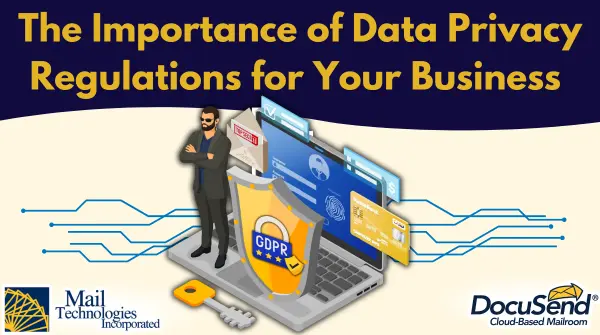The Importance of Data Privacy Regulations for Your Business

Customers are using digital technologies more than ever to interact with businesses and purchase products. The data trail they create provides many opportunities for companies, but it also creates a responsibility to keep customer data safe. Explore the many ways that businesses can use consumer data to better serve customers, and learn about their responsibilities when collecting and storing personal information.
How Companies Use Customer Data
Demographic information is often used in marketing, customer research, and product development. Personal information is typically used to manage payments, shipping, and order fulfillment. In some cases, location tracking data may be used in advertising and marketing.
Given how much data a company typically has on its customers, there is a huge risk of data loss if the organization is hacked. A typical data breach can expose millions of records. In fact, the largest data breach exposed 3 billion records. However, the total impact on the company may be larger because even those who aren't customers of the business will be watching the way an incident is handled.
Customers are aware of the risks of data loss. They are becoming increasingly selective about the types of data they share, and with which companies. A recent survey indicated that customers were more likely to share data with companies in the healthcare and financial sectors. However, they had a trust level of less than 50% for all industries, including these two.
Staying Compliant with Data Privacy Requirements
For businesses, the trend toward greater data privacy shows how important it is to collect and store customer information safely. Not only is there an ethical duty to safeguard personal information, but there are also laws that require it.
The General Data Protection Regulation, known as GDPR, is the most well-known regulation regarding data privacy. It is a European law. If your company does business on the continent, you'll need to be GDPR-compliant in how you handle data. If you only serve domestic customers, you can avoid GDPR. However, you may wish to be compliant anyway, since this can help build trust among your customers.
Domestically, the California Consumer Privacy Act (CCPA) passed in 2018 and went into effect on July 1, 2020. If your business serves California – even a single California citizen who places an online order – you must be compliant with CCPA.
CCPA and GDPR share some similarities. Among them is an insistence on giving individuals rights to the personal information that companies collect and store on their behalf. Rights restored to customers by these laws include:
- The right to opt out of certain data collection
- The right to delete data
- The right to know what data is collected from them
CCPA does not reduce a business's ability to collect customer data, but it does establish a high bar for claiming the data is anonymized or aggregated. The law demands that companies be more transparent about the types of data they're collecting, how they're storing this data, and the end use or sale of customer information.
There are fines associated with CCPA and GDPR. CCPA can fine businesses up to $2,500 per accidental violation. If the violation was deemed intentional, fines can escalate up to $7,500. There is no cap on the amount of fees that can be assessed.
GDPR caps its fines at €20 million or 4% of the company's business.
Whether you're concerned about a domestic customer base or a global one, the financial penalties can be serious. If you aren't yet fully compliant with either CCPA or GDPR, now is the time to change your data collection and management practices.
How to Be GDPR Compliant and CCPA Compliant
Three areas stand out when it comes to compliance with data privacy laws: security, data management, and automation.
GDPR-Compliant Security Controls
Security controls you'll need to implement include:
- Identity and access management: These practices control who within your organization has access to customer data.
- Incident response plan: Incident response plans indicate how the organization will respond if there is a data breach. These should be considered requirements for all companies, regardless of whether you conduct business in Europe.
- Policy management: This isn't something you can put into place once and check a box; it requires ongoing management. To stay in compliance with GDPR, your organization must develop, manage, and follow a rigorous set of policies.
GDPR-Compliant Data Management Practices
Companies must have procedures that address the following:
- Data access transparency: GDPR requires that companies be transparent about where their customer data is stored. For most businesses, this requires a comprehensive audit to uncover where data is and not where you think it might be.
- Data loss prevention: These measures protect data while it is stored, preventing the accidental loss or deletion of data.
- Encryption: Using a code, encryption protects data from being read while it is stored or transmitted. This way, if data is stolen it cannot be used as-is.
- Pseudonymization: Like encryption, pseudonymization prevents data from being used as-is in the event of a data breach. Pseudonymization works by disaggregating the data subject from other related records through database management and encryption.
- Compliance audits: Compliance audits are reports that show that a company understands and has complied with GDPR requirements. A typical audit will demonstrate how your business uses and stores personal data, by whom, and for what end. It should show that you allow customers the right to opt out and other rights afforded by GDPR, and that you have a robust policy in place to deal with data breach incidents.
GDPR Compliant Automation
Automation is the easiest way to nudge your business toward compliance with these practices. In this context, it means streamlining the processes regarding data collection, storage, and use. When you have automated processes, your business can not only keep up with compliance, but you can also better respond to an incident.
DocuSend’s automated online mailroom ensures the safety of your recipients’ information. With a focus on compliance, DocuSend uses advanced security measures. The system is cloud-based, and offers users peace of mind knowing that all invoices, documents, and communications they distribute are handled securely. Additionally, you can opt for HIPAA compliance if you're handling healthcare documents or sensitive financial information. In addition to physical USPS mail, you can send emails with encrypted links for secure document sharing via DocuLink.
It’s a Responsibility to Your Customers
Given the steep penalties associated with noncompliance, it's time to move your business toward compliance with these regulations. Yes, compliance takes a lot of effort; however, it does a lot to demonstrate accountability. This can increase customer loyalty and position your business as a trusted partner. When all is said and done, protecting customer privacy is a good thing for your business.

